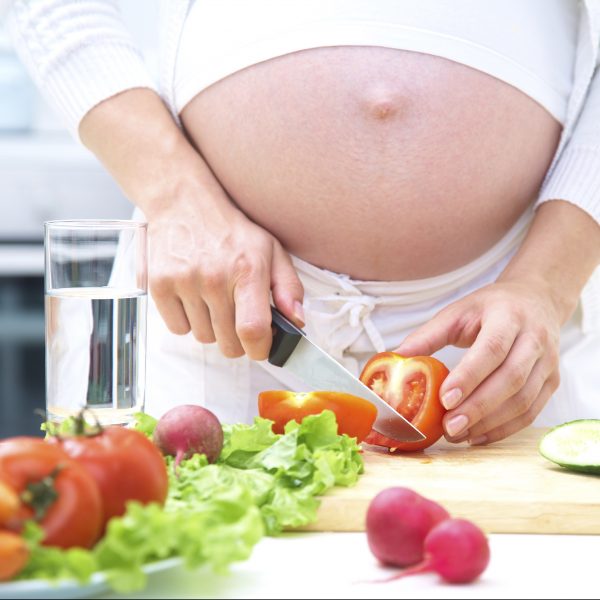One of the hottest topics for pregnancy health is Vitamin A supplementation. Is it safe? How much is too much? Am I getting enough from my diet?
Before we get to the answers to these questions, it is very important to know that Vitamin A is an antioxidant that is essential for a healthy pregnancy. Vitamin A is one of many nutrients that plays a critical role in:
- helping the body maintain homeostasis
- prevention of anemia
- supporting metabolism during pregnancy
- tissue maintenance and development (cell growth) in pregnancy
- fetal development, especially of the bones, teeth, skin, and vision
Recommended daily allowance (RDA) of vitamin A for healthy women in pregnancy, according to the American Pregnancy Association, is 770 mcg/dL. Tolerable upper intake levels* (ULs) of preformed vitamin A in pregnancy and during lactation (from foods and supplements) for women ages 19+ is 3,000 mcg/dL RAE or 10,000 IU per day (1 IU = 0.3 mcg retinol, or 0.6 mcg beta-carotene).
Vitamin A is available in the human diet in two forms. The first is preformed vitamin A, known as retinol and retinyl ester, that comes from animal foods – dairy products, meat, and fish. The second is provitamin A carotenoids, the most common being beta-carotene (but also alpha-carotene and beta-cryptoxanthin) that comes from many orange, red and yellow fruits and vegetables, as well as a variety of dark green leafy vegetables.
Vitamin A – Food Sources are Best!
Vitamin A is readily available from a variety of whole foods. The very best way to support your health in pregnancy and the health of your developing child is to eat a whole food pregnancy diet including the following foods high in vitamin A – carrots, squash, sweet potatoes, broccoli, apricots, spinach, pumpkin and liver (animal and fish) like Cod Liver Oil, milk and eggs. Vitamin A is also found in a quality whole food fertility specific multivitamin like the Fertilica™ Fertile Woman One Daily.
The Facts: Vitamin A Supplementation in Pregnancy
Too much…
When searching for information about vitamin A consumption in pregnancy, you will likely come across several resources stating that consuming vitamin A in pregnancy may cause congenital birth defects. While some studies have shown that consuming too much vitamin A in pregnancy may cause congenital birth defects that include malformations of the eye, skull, lungs, and heart, these studies were performed using very high amounts of synthetic, water-soluble forms of vitamin A which is vitamin A from non-food sources.
A study published in 2000 in the American Journal of Clinical Nutrition states that prior to that year, dating back to 1970, only “up to 20” reports had been filed relating high vitamin A intake in humans to harmful birth defects in fetuses.
The Linus Pauling Institute states that “No increase in the risk of vitamin A-associated birth defects has been observed at doses of preformed vitamin A from supplements below 3,000 mcg/day (10,000 IU/day) (21). Since a number of foods in the U.S. are fortified with preformed vitamin A, pregnant women should avoid multivitamin or prenatal supplements that contain more than 1,500 mcg (5,000 IU) of vitamin A. Vitamin A from beta-carotene is not known to increase the risk of birth defects.”
Too little…
Given that we work with women all over the world, it is important to share that women of some cultures suffer from vitamin A deficiency. Vitamin A deficiency often leads to the development of xerophthalmia which is thickening of the cornea and conjunctiva of the eye, as well as the inability to produce tears. The World Health Organization estimates that 9.8 million pregnant women worldwide have xerophthalmia.
Studies, as shared of in the Cochrane Database of Systematic Reviews, have reported other effects of vitamin A deficiency as well, this may include an increased incidence of anemia and lowered immunity to disease and illness for pregnant and lactating mothers, as well as her infant child. Vitamin A deficiency in children can cause slower growth and development. The detrimental effects of this vitamin deficiency on mothers and their infants puts them at higher risk for death.
Summary
In conclusion, we know that vitamin A is an essential pregnancy nutrient for both a mother and her child. The focus should be on eating whole food sources of vitamin A and following a pregnancy diet composed of foods offering a wide variety of nutrients needed in pregnancy. In order for pregnant mothers to get the necessary nutrients they need, supplementing with a whole food prenatal multivitamin is advised. This helps prevent nutritional deficiencies, including that of vitamin A. Learn which nutritional supplements are safe for pregnancy here… and browse our complete library of Pregnancy Health articles… for more information. And perhaps most important, talk to your doctor if you are unsure or concerned about any nutrient you’re wanting to take in pregnancy. Here’s to a happy and healthy pregnancy!
* Tolerable upper intake levels (ULs) means the highest amount show to be safe to consume daily without causes adverse affects.
- Azaïs-Braesco, V., & Pascal, G. (2000). Vitamin A in pregnancy: Requirements and safety limits. The American Journal of Clinical Nutrition, 71(5). doi:10.1093/ajcn/71.5.1325s Retrieved from: https://academic.oup.com/ajcn/article/71/5/1325S/4729494
- Barton, D. (n.d.). Cod Liver Oil Essential for Healthy Fertility and Pregnancy. Retrieved from: https://natural-fertility-info.com/cod-liver-oil-essential-for-healthy-fertility-and-pregnancy.html
- Nutrients and Vitamins for Pregnancy: American Pregnancy Association. (2012, April 26). Retrieved from: http://americanpregnancy.org/pregnancy-health/nutrients-vitamins-pregnancy/
- Helt, AM. Personal Communication, January 2014
- Higdon, J., & Drake, V. (2003, December 1). Linus Pauling Institute Micronutrient Research for Optimum Health – Vitamin A. Retrieved from: https://lpi.oregonstate.edu/mic/vitamins/vitamin-A
- Van Den Broek, N., Dou, L., Othman, M., Neilson, J., Gates, S., & Gülmezoglu, A. (2010, November 1). Vitamin A supplementation during pregnancy for maternal and newborn outcomes. Cochrane Database of Systematic Reviews, Retrieved from: https://www.cochranelibrary.com/cdsr/doi/10.1002/14651858.CD008666.pub3/full
- Office of Dietary Supplements – Vitamin A. (n.d.). Retrieved from: https://ods.od.nih.gov/factsheets/VitaminA-HealthProfessional/





